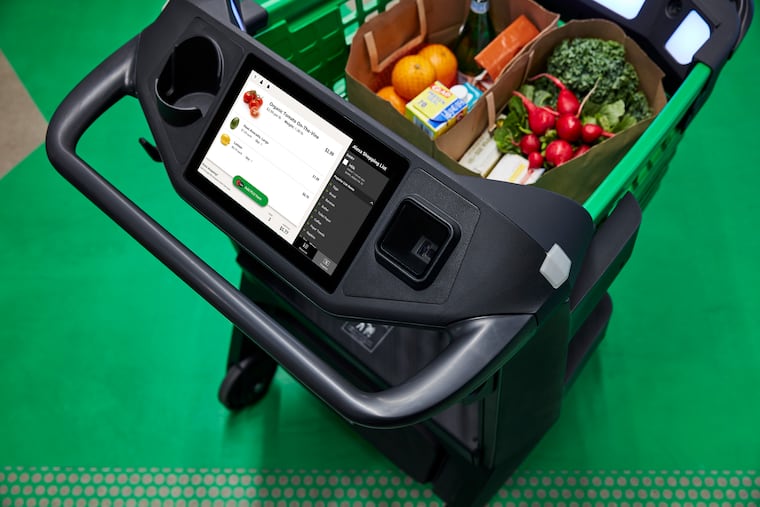Smart shopping carts on the rise as stores adapt to pandemic era
Kroger is the latest retailer to embrace automation at a time when shoppers are more thoughtful about who they come in face-to-face contact with.

Kroger is the latest retailer to embrace automation at a time when shoppers are more thoughtful about who they come in face-to-face contact with.
The grocery store chain revealed last week that it has partnered with artificial intelligence firm Caper to deploy computer vision-enabled shopping carts at a supermarket in Cincinnati. If the test run is successful, the retailer will add connected buggies to more of its stores around the country.
Kroger now has 20 branded smart carts built to know what customers place inside. The wireless buggies can tally up your total, make recommendations, and allow you to pay for groceries directly on the cart. The gadgets eliminate the need to stand in line around strangers or pass off items to a salesclerk.
For the past few years, connected shopping carts were billed as a way to cut down on labor costs, get customers to spend more, and shift patrons out of stores more swiftly. However, according to Caper, the pandemic has pushed more companies to check out the trend to reduce face-to-face interactions amid the ongoing pandemic.
“In response to the COVID-19 pandemic, the demand for autonomous checkout technology is driving grocers and retailers to innovate and adopt new technologies that keep shoppers safe and streamline checkout,” Lindon Gao, CEO and cofounder of Caper, said in a statement.
Smart carts drive customers to spend more since the baskets can tally up totals in real-time and expose people to more marketing materials while shopping, the AI company claims. For instance, if you buy cereal, it might recommend that you buy milk as well. The firm says an average shopper’s checkout total increases 18% when using its product.
The new ways to shop don't come cheap. Smart carts can cost retailers between $5,000 and $10,000 per unit, according to Sylvain Charlebois, a professor of food distribution and policy at Canada's Dalhousie University who has studied smart carts. The devices require a lot more maintenance and upkeep compared to simple shopping carts, which tend to cost retailers under $100 each. Caper says most of its smart cart partners recoup their investment within a year.
Caper, which has raised more than $14 million in funding, claims its tech isn't meant to replace jobs but free up more frontline grocery store workers to maintain the aisles or offer customer service. The data generated from smart carts enable the tech firm to improve its product recommendations. Its tech can provide dietary suggestions based on what grocery customers have purchased in the past and recipe recommendations based on what shoppers have in their cart. Caper also shares shopper information with the partnering retailer so the store can better manage inventory and gleaning where people are going.
Caper says it doesn't share shopping data beyond the partnering retailer.
Kroger operates more than 2,700 stores, and it’s the third national retail chain to pick up the start-up’s smart carts over the past 12 months, Caper says.
The Kroger collaboration comes months after Amazon launched a competing product. (Amazon founder Jeff Bezos owns The Washington Post.)
Last year, Amazon introduced its smart Dash Carts to one of its stores in Woodland Hills, Calif. Customer feedback was so positive that Amazon added them to five more locations in California and an Amazon Fresh store in Naperville, Ill.
"They've been so popular that we've added more Dash Carts to many of our Fresh stores just to keep up with demand," an Amazon spokesperson said.
Amazon's smart carts require customers to download an app to their personal smartphone, while Caper's does not. Amazon's tech also requires stores to have a system of sensors in place to monitor what patrons are doing. With Caper, everything is built into the cart itself.
At Kroger, the automated carts are lined up alongside traditional shopping buggies near the entrance, so shoppers can still choose ordinary carts if they want.
The supermarket's "KroGO" carts utilize computer vision and artificial intelligence to recognize groceries placed inside the basket. The carts have three cameras that capture what an item looks like from various angles. Then, on the back end, Caper's software generates a 3D model and compares that to a database of product images to determine what the grocery item is.
The price is then displayed on the screen. When a customer removes an item from the cart to put it back on the shelf, their checkout total adjusts accordingly, Caper says. The gadgets also have an onboard scale to measure foods sold by weight and the tech allows shoppers to scan loyalty cards and view coupon offers.
The grocer launched the pilot with a 5% discount for shoppers who use its new “limited contact” method.